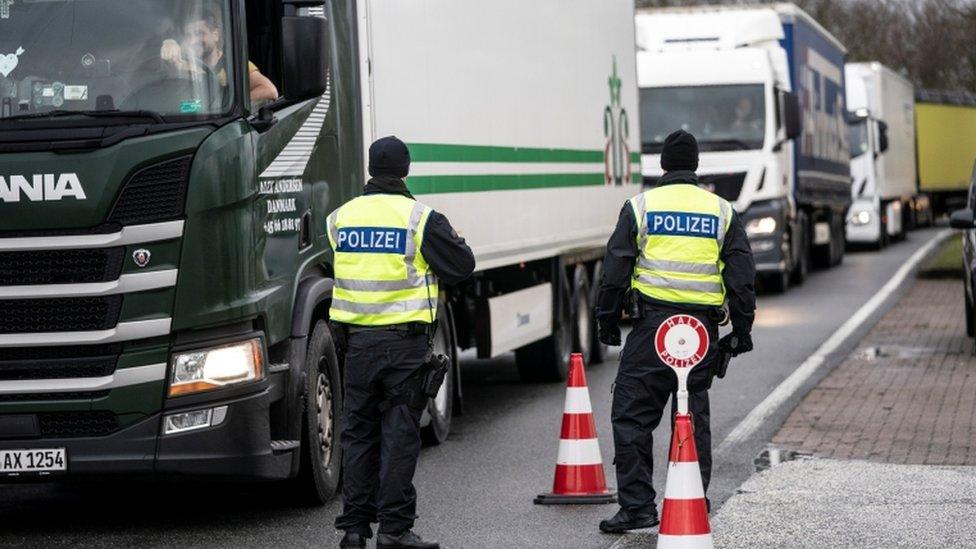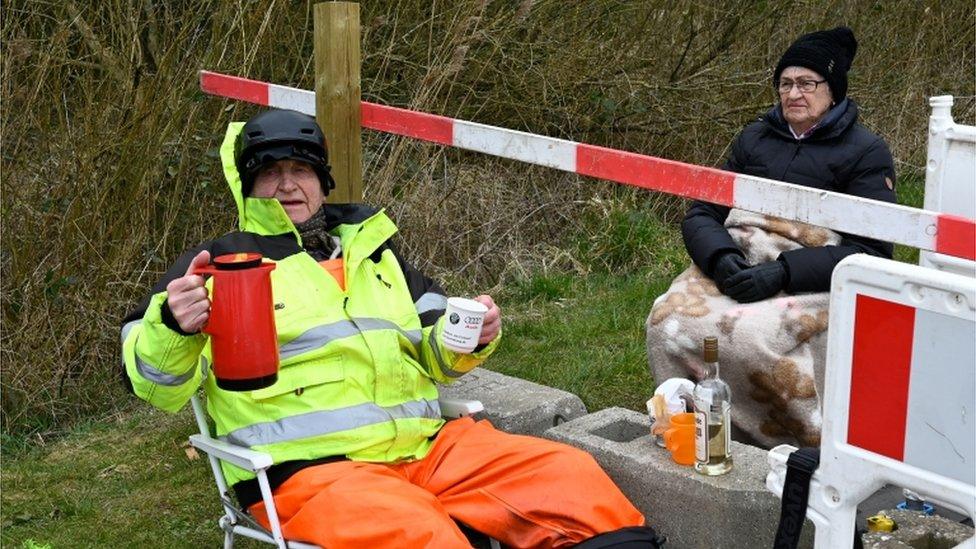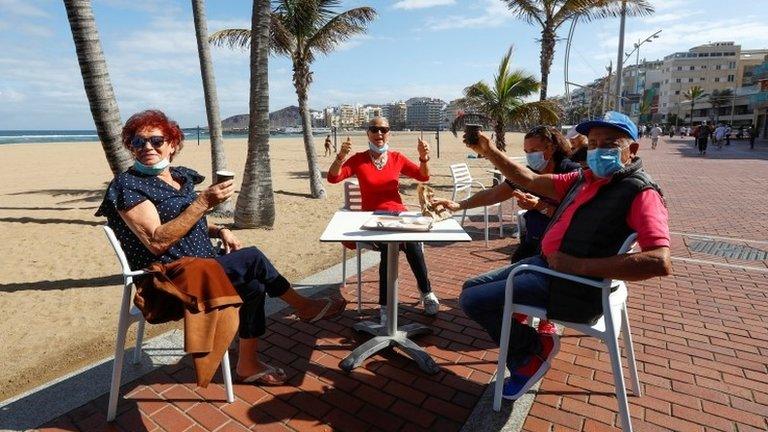Coronavirus: Denmark opens borders to divided lovers
- Published

The Germany-Denmark border was closed when the coronavirus outbreak hit in March
Denmark has opened its borders to couples who were separated from their partners by the coronavirus lockdown.
As of Monday, cross-border couples who reside in the Nordic countries or Germany can now visit Denmark.
Rules currently require people to prove their relationship with photos, text messages and emails.
But the justice minister has announced these regulations will be relaxed in the coming days, so all that is needed is a letter signed by both parties.
"If you say you are a boyfriend and sign [the letter], we will assume it [is true]," Justice minister Nick Hækkerup told broadcaster TV2.
A number of European countries are considering reopening Europe's internal borders as the outbreak eases.
Germany has proposed allowing travel to all 26 other EU states plus the UK and non-EU countries like Iceland and Norway that are in the border-free Schengen zone from 15 June. The EU has issued guidance on how best to lift restrictions on travel.
But many restrictions remain in place. Several people have told the BBC about their frustration with ongoing rules about partners even as countries ease their lockdown measures.
What are the rules?
Currently, the authorities say people must give the name, address and contact details of their partner in Denmark, as well as phone records, photos and text histories to prove the relationship.
Permanent residents of Finland, Iceland, Germany, Norway and Sweden all qualify, provided their partner is a resident of Denmark.
How dating and love continue for three couples during the coronavirus lockdown.
Police also said this applies only to people in serious relationships, which they defined as of roughly six months - with actual face-to-face meetings and not purely online or via the phone.
Opposition parties, however, criticised the stringent rules, prompting a government rethink. While they are sticking to the guidance about "serious" relationships, partners will simply need to sign a piece of paper declaring this is the case, and will be allowed to enter the country.
"Although the other parties are in opposition, they can sometimes say sensible things - and I always listen to the other parties," Mr Hækkerup said.
The rules also say anyone from Germany or the Nordic countries who owns a holiday home in Denmark can come to the country.
How will this affect couples?
The new regulations will be good news for thousands of separated couples.
One pair who caught the world's attention when the outbreak hit Europe in March were octogenarians Inga Rasmussen from Denmark and Karsten Tüchsen Hansen from Germany.
Both have been travelling to the border town of Aventoft to chat and share a drink, sitting at the recommended safe distance.

Inga Rasmussen from Denmark, right, and Karsten Tüchsen Hansen have been meeting at the border
But there are many others who remain separated from their partners by borders.
Some in Denmark have created a Facebook group, Girlfriends Separated by Border Closures, for those affected under the lockdown.
Carl Gustav Gylling, a 23-year-old student from Copenhagen, has not seen his Swiss girlfriend since the start of March. Though he supported the lockdown initially, Mr Gylling told the BBC he was growing frustrated with European governments discussing opening borders to tourists and international business, but not for partners to frequently visit one another.
"I'm more than sure right now that couples would do anything to see each other," he said in emailed comments. "Even going into a three-week quarantine [on arrival], which would solve basically all problems."
Christian Trampedach - separated from his girlfriend, who lives in Brazil - said the government had "equated couples and tourists" during discussions about ending the lockdown.
"I dare to say that being away from your loved ones causes more emotional distress than being forced to skip another summer vacation," he said.
Donny ter Heide is a 24-year-old project engineer living in Enschede in the Netherlands. His girlfriend Mira lives in Copenhagen, and they have not seen each other since 16 February.
They chat daily on the phone and online, and use Skype at least once a week. He told the BBC the worst part was not having "a timeframe" for things to go back to normal.
"We would just like to know when we're able to see each other and what the rules will be if we visit one another, like, do we need to stay in quarantine or anything," he said. "It is making it very hard on both of us."
Laila Svanholmer agrees. Her boyfriend lives in California in the US, and she told the BBC that not knowing when she might see him again was "unbearable".
"It's frustrating, stressful and heartbreaking to be forcefully separated from the person you love," she said, describing the border closures as "entirely political decisions", and not medical ones.
She also questioned why tourists with holiday homes could visit and not partners. "They come here to spend a week or two at the beach. How can that be more essential than visiting a loved one?"
US President Donald Trump imposed a travel ban on 26 European countries in March, a move met with anger and confusion in the EU.
- Published30 March 2020

- Published11 April 2020

- Published13 May 2020
